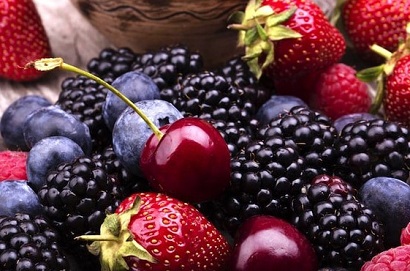Nikhil Prasad Fact checked by:Thailand Medical News Team May 29, 2024 10 months, 3 weeks, 6 days, 8 hours, 34 minutes ago
Health News: Cardiovascular diseases (CVDs) stand as the leading cause of death globally, responsible for an estimated 18.6 million deaths annually. These diseases, defined by the World Health Organization (WHO) as a group of conditions affecting the heart and blood vessels, range from cerebrovascular disease to congenital heart defects. While pharmaceutical treatments exist, their long-term use can result in adverse effects like hemorrhagic stroke and renal failure. This has sparked interest in dietary interventions, particularly those rich in bioactive compounds found in fruits and vegetables, to mitigate CVD risk. Among these, cherries and berries have gained attention for their rich phenolic content and potential cardiovascular benefits and have been covered in numerous
Health News coverages.
 "Berry Good for the Heart: The Cardiovascular Benefits of Cherries and Berries"
Phenolic Compounds: The Heart's Best Friend
"Berry Good for the Heart: The Cardiovascular Benefits of Cherries and Berries"
Phenolic Compounds: The Heart's Best Friend
Phenolic compounds, including phenolic acids, flavonoids, and stilbenes, are secondary metabolites in plants that provide strong antioxidant and bioactive properties. These compounds are abundant in red fruits like cherries and berries. They exhibit a wide range of health benefits, from anti-inflammatory and anti-diabetic effects to antimicrobial and anti-cancer properties.
The Rich Composition of Cherries and Berries
Cherries and berries contain various phenolic compounds:
-Phenolic Acids: Hydroxycinnamic acids (e.g., chlorogenic acid) and hydroxybenzoic acids (e.g., gallic acid).
-Flavonoids: Anthocyanins (e.g., cyanidin-3-O-glucoside), flavonols (e.g., quercetin), and catechins.
-Stilbenes: Resveratrol, known for its cardiovascular benefits.
These compounds contribute to the antioxidant, anti-inflammatory, and vasodilatory properties of cherries and berries, making them valuable for cardiovascular health.
Cardiovascular Disease and Its Risk Factors
CVD encompasses a range of conditions such as coronary heart disease, cerebrovascular disease, and peripheral arterial disease. The primary cause of CVD is atherosclerosis, characterized by lipid accumulation and inflammation in large arteries. Risk factors include dyslipidemia, oxidative stress, diabetes mellitus, hypertension, smoking, aging, and genetic abnormalities. Behavioral factors like poor diet and physical inactivity also play significant roles in the prevalence of CVD.
Cherries and Berries in Cardiovascular Health
Numerous studies have investigated the impact of cherry and berry consumption on cardiovascular health, focusing on their effects on blood pressure, lipid profiles, inflammation, and endothelial function.
Blood Pressure Reduction
High blood pressure, especially isolated systolic hypertension, significantly increases the ri
sk of CVD. Studies have shown that regular consumption of cherries and berries can lower blood pressure. For example, tart cherry juice has been demonstrated to reduce systolic blood pressure in both in vivo studies and clinical trials. The vasodilatory effects of anthocyanins, such as those found in tart cherry juice, contribute to these benefits. Additionally, freeze-dried blueberries and strawberries have been shown to reduce blood pressure in sedentary and obese adults.
Lipid Profile Improvement
Dysregulated lipid metabolism and elevated levels of triglycerides and low-density lipoprotein cholesterol (LDL-C) are major risk factors for CVD. The phenolic compounds in cherries and berries help improve lipid profiles by increasing high-density lipoprotein cholesterol (HDL-C) and decreasing LDL-C and triglyceride levels. For instance, daily consumption of strawberries has been shown to significantly reduce total cholesterol, LDL-C, and triglycerides.
Anti-Inflammatory and Antioxidant Effects
Inflammation and oxidative stress play crucial roles in the pathophysiology of atherosclerosis and other cardiovascular conditions. Phenolic compounds in cherries and berries exhibit strong anti-inflammatory and antioxidant effects. They reduce markers of inflammation such as TNF-α and IL-6 and increase antioxidant enzyme activity, thereby reducing oxidative stress. This helps maintain endothelial function and prevents the progression of CVD.
Enhancing Endothelial Function
Endothelial dysfunction, a key marker of cardiovascular health, can lead to atherosclerosis and hypertension. Studies have shown that cherry and berry consumption improves endothelial function by increasing nitric oxide (NO) production and reducing oxidative stress. This is crucial for maintaining cardiovascular homeostasis and preventing CVD.
Challenges and Future Directions
Despite the promising findings, several challenges and limitations exist in assessing the relationship between cherry and berry consumption and cardiovascular health. These include variability in fruit composition, processing methods, and study design. Moreover, the optimal dosage and form of fruit consumption (e.g., whole fruits, juices, freeze-dried powders) remain unclear.
To address these challenges, longer-term studies with diverse populations are needed to better understand the cumulative effects of fruit consumption on chronic disease risk and overall health outcomes. These studies should also prioritize the evaluation of underlying mechanisms by which specific fruits or their bioactive compounds exert beneficial effects.
Conclusion
The consumption of cherries and berries holds significant potential in reducing risk factors associated with CVD. Their rich selection of bioactive compounds, including phenolic acids, flavonoids, and anthocyanins, offers multiple health benefits ranging from blood pressure reduction to lipid profile improvements and enhanced endothelial function. While challenges remain in standardizing and optimizing fruit consumption for maximum health benefits, the evidence supports incorporating these fruits into preventive strategies against CVD. Further research will help maximize their health benefits and improve clinical practice, ultimately contributing to better cardiovascular health and reduced mortality worldwide.
The study findings were published in the peer reviewed journal: Nutrients.
https://www.mdpi.com/2072-6643/16/11/1597
For the latest
Health News, keep on logging to Thailand Medical News.
Read Also:
https://www.thailandmedical.news/news/herbs-and-phytochemicals-merits-of-angelica-sinensis-against-cardiovascular-and-cerebrovascular-diseases
